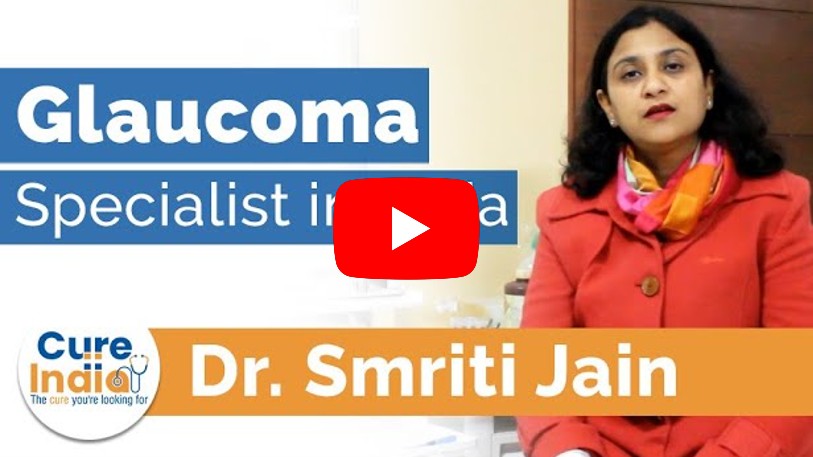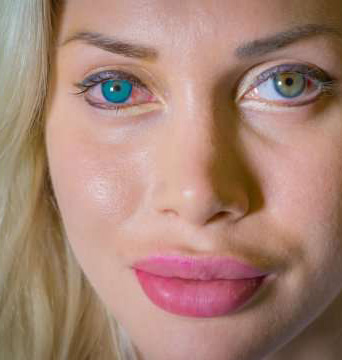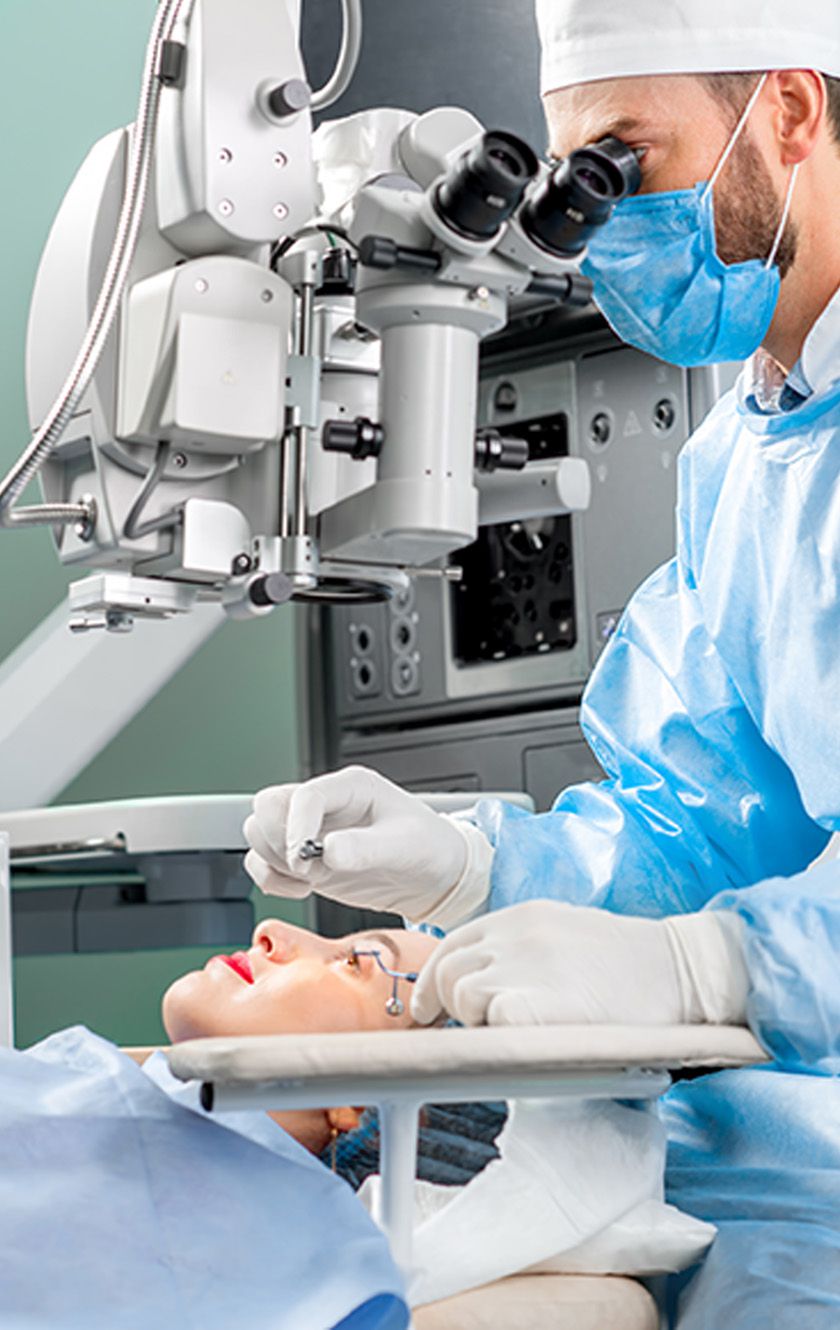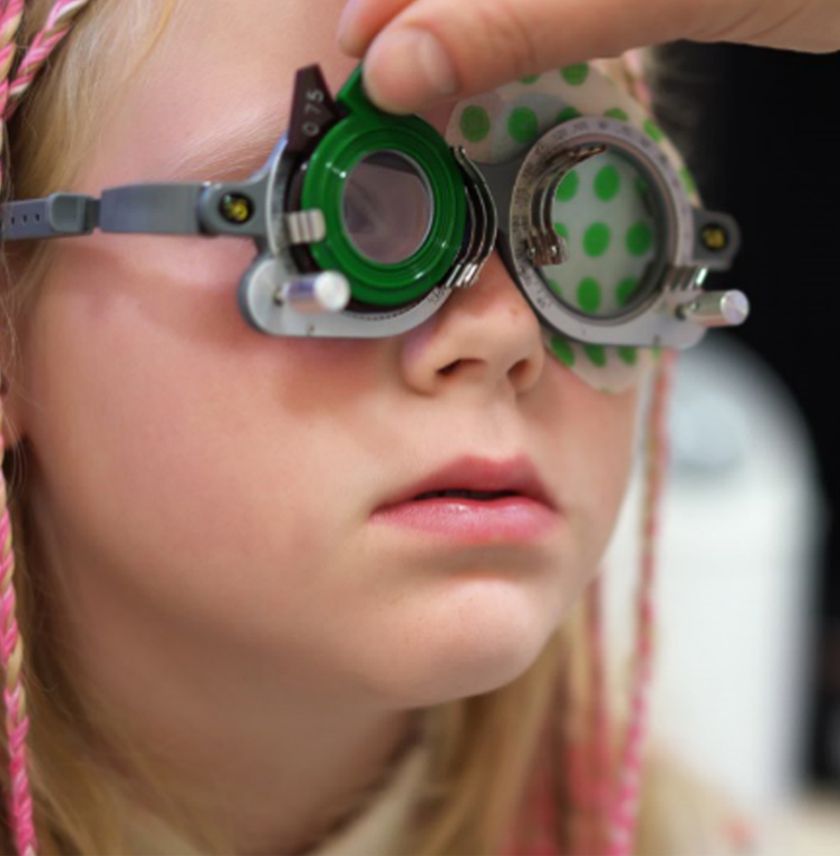

Glaucoma is a general term to describe a group of progressive eye diseases that damage the optic nerve of the eyes. The optic nerve is a nerve of the eyes that transmits visual signals from the eyes to the brain describing what is viewed/detected by the eyes. The damage to this optic can lead to blurred vision. It progresses to irreversible blindness.
Glaucoma is also known as a silent blinder because it does not show any early-stage symptoms. The principal cause of glaucoma is increased pressure in the eyes due to the fluid buildup in the front part of the eyes. Glaucoma is the 2nd leading cause of complete blindness on the globe and a leading cause of blindness in people over 60 years of age.
However, it also affects people younger than 60 years. It can affect anyone who has fluid buildup in the eyes. This fluid puts pressure on the eye (known as intraocular pressure (IOP) or eye pressure). Most people develop this condition in both eyes, but it can be mild in one eye and worse in another.The glaucoma treatment in India is how you can treat this problem.
African countries have the highest prevalence of blindness caused by glaucoma in the world. The prevalence is predicted to double by the year 2024. Glaucoma is a condition that requires life-long treatment and regular eye checkups to save the sight of the patient. However, the reports show that this is very challenging in African countries, as most of the people with glaucoma are treated with eye drops in these countries.
The eye drop bottles are not easily accessible due to the cost of the medication and the distance to the nearest eye clinic. Also, most people do not receive an early diagnosis of this condition. Some patients ignore the condition and stop using eye drops due to a lack of awareness.
A lot of people from African nations like Ethiopia, Tanzania, Ghana, and Kenya travel to India every year for different types of medical treatments, including glaucoma eye diseases. India has the most advanced Glaucoma eye clinics and hospitals, which are equipped with the most advanced and modern technologies for glaucoma treatment in India.
The eye specialists in Indian hospitals receive training and experience from international institutions. The years of knowledge of the doctors and the highly equipped medical facilities in India make it a hub of medical treatments for international patients. The cost of medical treatments in India is comparatively low, so it is highly profitable for people coming from different countries for medical care.
Our eyes produce a fluid that is called aqueous humor. The function of the fluid is to nourish the eyes and to maintain proper ocular pressure. The right pressure is maintained when the same amount of fluid comes through the pupil in the eyes. The same amount leaves the eyes through the drainage canal, which is located between the iris and cornea. When a person has eye disease, a normal amount of fluid enters the eye, but the same amount of fluid cannot leave the eye as the drainage system clogs. Due to this, more fluid stays in the eyes, and hence, more pressure is exerted on the eyes. This elevated intraocular pressure can damage the optic nerve, which eventually leads to glaucoma.
This condition can affect anyone, but certain people have an increased risk of developing glaucoma and others.
You should have a regular eye checkup if you have any of the mentioned conditions. Talk to your eye doctor to find out whether you have an increased risk of developing eye disease.
There are many different types of glaucoma. Studying about them is what will help you dind the right Glaucoma treatment in India. However, the most common glaucoma types are discussed below.
It is the most common type of glaucoma. It is slow-growing and often unnoticeable until vision loss develops. This type of glaucoma occurs when the entrance of the eye’s drainage system is clear but it is clogged from the inside.
It is also known as narrow-angle glaucoma or acute glaucoma. It occurs when the outer edge of the eye’s iris stops the fluids from leaving the eyes. When this happens, the fluid gets built up quickly, which then leads to an increase in eye pressure. If left untreated, it can cause blindness just within a few days.
It is a type of eye disease in which the optic nerve of the eye becomes damaged even though the intraocular pressure is within the normal range. It mostly affects people who have a family history of glaucoma or who have heart problems such as low blood pressure or irregular heartbeats.
As the name suggests, this type of glaucoma develops in an infant or during the birth of a baby. It develops when there is an abnormal growth of the drainage system in the eyes, which increases the eye pressure. Glaucoma symptoms in babies include epiphora (tear overflow), involuntary twitching of eyes, light sensitivity, enlargement of eyes, etc.
It occurs when the eyes develop extra blood vessels near the eye area from where the fluids normally drain out. It can be caused by some other medical conditions like diabetes, high blood pressure, etc.
This occurs when the pigment of the iris peels off and stops the fluid from leaving the eye through the drainage system. People who have nearsightedness are more likely to develop this condition.
It is also known as pseudoexfoliation, which is a type of open-angle glaucoma. It occurs in people facing exfoliation syndrome, characterised by the deposition of extra materials on the eye’s parts, stopping the fluid from draining.
It affects people who have uveitis, which is characterized by swelling or inflammation in the eyes. People who have been taking steroid medication have an increased risk of developing this condition.

Glaucoma does not show any early signs or symptoms. The vision changes develop gradually as the disease progresses. Therefore, it is easy to miss the slight symptoms that it might have shown. Because of this reason, it is very important to get your eyes regularly checked by a reputable eye doctor to detect any medical condition that has started in the eyes. The damage caused by glaucoma is irreversible, so it is crucial to get an early diagnosis and treatment to prevent it from getting worse. However, the most common signs and symptoms of glaucoma can include:
It is extremely important to detect eye diseases like glaucoma in their early stage to initiate the glaucoma treatment in India as soon as possible. This is because glaucoma is an irreversible eye disease which, if not treated early, can lead to blindness. Many different tests can detect this condition. Your ophthalmologist may suggest the following common tests to check if you have glaucoma.
■ Visual field test: It is a test to evaluate central and peripheral vision of a patient. It helps to detect the areas of vision loss. In this test, the patient will be asked to look at the series of light spots and press the buttons to tell which ones can see.
■ Tonometry: It is a test that evaluates the intraocular pressure of the eye. A device known as a tonometer is used for this purpose.
■ Ophthalmoscopy: It is tested to examine the optic nerve which is present at the back of an eye. The thinning of this nerve indicated the presence of glaucoma.
■ Gonioscopy: It is a test that examines the area from where the fluid should leave or drain the eye i.e. the space between the iris and cornea which is filled with fluid. It helps to check if the area is open or closed.
■ Pachymetry: This is an eye test to evaluate the thickness of the cornea. The thickness is measured because it can interfere with the intraocular pressure.
■ Optical coherence tomography (OCT): It is a type of imaging test that creates high-resolution cross-sectional images of the optic nerve and retina so that the doctor can examine the thickness of nerve fibers and also notice any structural changes that it might have.
Depending on the severity of your glaucoma condition and other factors, your ophthalmologist will plan a perfect plan for glaucoma treatment in India. The different types of glaucoma treatment options, like the glaucoma laser surgery that is available in India, are explained below.

■ Trabeculectomy: This surgical procedure is mostly used for open-angle glaucoma. This glaucoma treatment in India is considered a major surgery but only takes about 30 to 60 minutes. The surgery is performed under general anesthesia where the doctor numbs the area first and then makes a small incision in the top of an eye, beneath the eyelid to create a channel so that the excess fluid can drain out. The channel is held open with the help of stitches.
■ Glaucoma implant surgery: It is also known as tube shunt surgery mostly used for congenital or neovascular glaucoma. During this type of surgery, a small tube is surgically placed in the eye to make the excess fluid drain out through the implanted tube.
■ Minimally invasive glaucoma surgery (MIGS): This Glaucoma Treatment in India uses tiny incisions known as microincisions and microscopic equipment to reduce the intraocular pressure in the eyes. The types of MIGS include Trabectome, Ab-Interno Canaloplasty (ABiC), Suprachoroidal Shunts, etc.
■ Laser trabeculoplasty: It is a treatment procedure that uses a laser to reduce the intraocular pressure in the eyes. It targets the blockage in the natural drainage system of the eyes and removes it.
■ Cyclophotocoagulation: It is also a type of laser treatment that not only reduces the intraocular pressure in the eye but also reduces the fluid buildup in the eye by targeting the ciliary processes (the method by which the eye produces the fluid) in the eye.
■ Laser peripheral iridotomy (LPI): It is a glaucoma treatment in India procedure in which the surgeon makes a small incision/hole in the outside edge of the iris to make an open angle in the eye so that the fluid can easily drain out through the meshwork.
Immediately after the surgical glaucoma treatment in India, your doctor will cover your eye with and eye patch or an eye shield to protect the eye. Keep this eye patch to stay protected from dust, germs, air, etc. You will need someone from your family or friend to drive you home after the surgery.
Your doctor will give you a follow-up appointment on the day after your glaucoma treatment. It helps to check the treated eye and make sure that everything looks fine. You may have some mild discomfort, swelling, or irritation after the surgery, but it is temporary. It will go away as you heal.
Your ophthalmologist may suggest you avoid lifting heavy weights, strenuous activities, driving, reading, and bending. He may suggest you rest for at least 2 days after the surgery. In addition to that, make sure to take the medicines as per the doctor’s prescription. You can return to work in 1 week after the glaucoma treatment in India. However, if your work is highly strenuous, then you should avoid working at least for 2 weeks. You can resume the other activities like reading, using electronic devices, etc after a few days of surgery.

CureIndia is an online platform that assists you in choosing the right medical facility performed by the best medical specialist. The majority of the doctors in our association are globally trained. They are professionals who are highly experienced, knowledgeable, and skilled. Most of them are active members of many international medical councils and associations. Let us hear from some of the most reputed Glaucoma doctors in India about glaucoma treatment in India.




The cost of glaucoma treatment in India can range from 1,200 USD to 2,000 USD. However, the total cost can vary because it depends on the summation of the different costs such as the travel cost, hospital cost, surgeon’s fees, medication cost, insurance coverage, stay cost, etc. The costs of different types of glaucoma treatment in India are listed below.
| Treatment | Cost in India | Stay in India |
|---|---|---|
| AGV Glaucoma Surgery Cost | $2,000 Per Eye | 5-7 days |
| TRAB Glaucoma Surgery Cost | $1,200 Per Eye | 5-7 days |
The cost of the same procedures in the USA ranges from 1,000 USD to 2,000 USD for laser treatment, and it can even go as high as 11,000 USD for incisional surgeries. The cost of the treatment in India is lower than in developed countries like the USA.
Glaucoma is considered a group of diseases that are related to the eyes. It damages the optical nerve of the eye, whose function is to transmit the visual signals detected by the eyes to the brain. Glaucoma causes excess fluid buildup in the eye, which increases the intraocular pressure in the eye and further leads to damage to the optic nerve
When this happens, the patient starts having visual problems, and over time, if the condition is not treated, it can lead to total blindness. It is considered the 2nd leading cause of total blindness after cataracts in the world.
It is crucial to receive its early diagnosis and treatment because it is an irreversible condition, and if not treated early, it makes people completely blind, and then it cannot be cured. Because of low glaucoma treatment in India costs and the premium medical service, a lot of people from different countries travel to India just for medical treatment. Choosing India for the treatment of various medical conditions is highly favorable and profitable, as there is no country other than India that provides quality medical service at this cost.


Get the Eye color you've always dreamed of
Connect Today
Opt for successful eye color change surgery
Plan Surgery
Remove glasses with SMILE LASIK
Get Cost